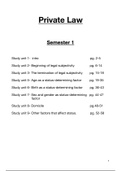Private Law
Semester 1
Study unit 1- intro pg. 2-5
Study unit 2- Beginning of legal subjectivity pg. 6-14
Study unit 3- The termination of legal subjectivity pg. 15-18
Study unit 5- Age as a status-determining factor pg. 19-35
Study unit 6- Birth as a status-determining factor pg. 36-43
Study unit 7- Sex and gender as status-determining pg. 44-47
factor
Study unit 8- Domicile pg.48-51
Study unit 9- Other factors that affect status. pg. 52-58
1
,Study unit 1
Definitions of concepts and terminology
Definitions: law of persons
-part of objective law
-regulates certain things (3)- coming into existence, private law status, coming to end of
Natural person as legal subject.
• The importance of being recognised as a ‘person’ in the law is that the law
recognises that you have legal rights and duties.
• Only persons have legal rights and duties.
• This is the essential characteristic that distinguishes a person from a legal object.
1. Subdivision of objective law
1.1 what is objective law?
• SA national law
1.2 How is objective law subdivided?
• Public law
• Private law -law of things, law of succession, contract law, family law, law of delicts,
law of persons
• Mercantile law
Who/ what qualifies as a legal subject?
Defintion: Natural persons, juristic persons
Legal Subject
Anyone or anything that can be bearer of rights, duties, capacities
Natural Persons/ human beings
• South African law
• Roman law and Roman- Dutch law
1) Slaves
2) Mostra- babies born deformed that they cannot be recognised , father has the right to
choose to kill the baby or not
Juristic persons
• Group or associates eg company, uni, church, bank, political party, union
• Legal subject in terms of the law
• Existence independent of members
2
,SA: 3 types of juristic persons
1) Societies incorporated in terms of a vernal enabling act- eg companies act, neutral
bank act
2) Societies created and recognised in separate legislation
3) Common law requirements e.g churches, political parties and even if members
change, entity must continue to exist as a juristic person.
Subjective rights
• Network of legal relationships amongst legal subjects
• Network of legal relationships which exists between legal objects and subjects
Object Subject
Subject
Legal objects
Four categories
A) Things-houses, farms, cars - physical things
B) Performance- delivering something/to do/to not do/give (babysitting, payment of
money)
C) Immaterial property- intellectual property
D) Personality property- persons reputation/dignity/good name
Real rights -A
• Where the object of a right is a physical thing, the right is a real right .
• Eg if a person in the world owns a thing, everyone in the world has a corresponding
duty towards him or her, They must not interfere with his or her real right of
ownership.
• We classify the right as a real right because the object of the right is a physical thing
• Its johns house so he’s has a real right of ownership- everyone has a duty to respect
johns right and not to interfere with it.
3
, Personal rights - B
• When the object of the right is performance, the right is a personal right.
• Real rights operates against the whole world - everyone has a duty to respect a real
right.
• Personal rights however, operates primarily against a particular person- the person
who owes the performance.
• Eg. John + Mary have agreed that Mary will babysit Johns children on Sat night and
that John will pay her R200
-This agreement (contract) creates two personal rights: John has the personal right to the
performance of babysitting and Mary has the corresponding duty to babysit. Mary has the
right to be paid R200 and John has the corresponding duty to pay Mary R200.
Personality Rights-D
The personality interests protected in SA law include:
• Physical integrity (the body)
• Bodily freedom, for eg protection against unlawful arrest
• Reputation
• Dignity
• Privacy
Connection?
The objective law determines content and limits of every subjective right.
Status
Description: status =‘stare’
Standing in terms of the law and individuals roles, functions in legal intercourse
Definition: Sum total of a legal subjects juridical capacities
A) legal capacity / passive capacity
B) Capacity to act
C) Capacity to litigate
D) Accountability
Factors - affecting nature, extent of persons capacities
1) Age
2) Insanity
3) Prodigality
A) Legal capacity
The competency to have rights and duties
B) Capacity to act
Capacity to participate in legal intercourse - to perform valid juristic acts
4





